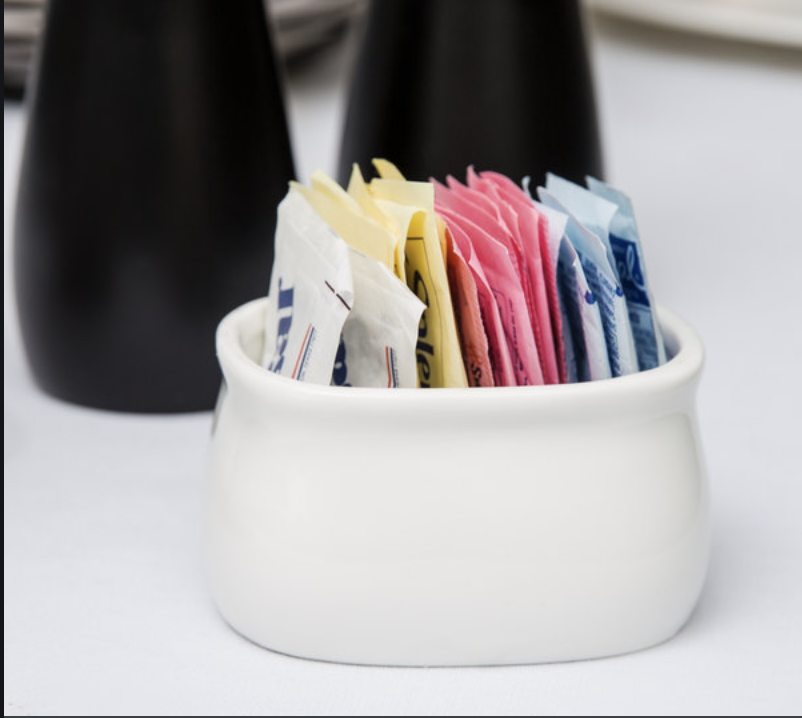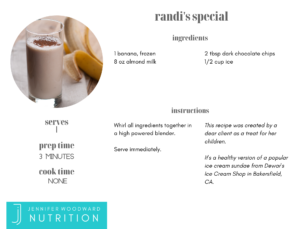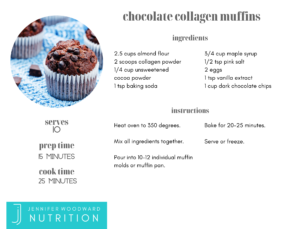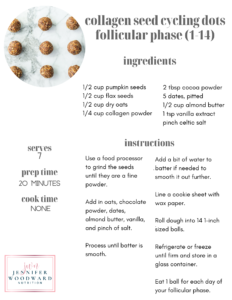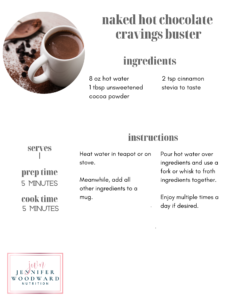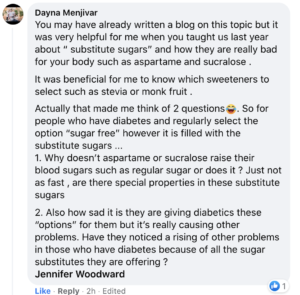What Do I Use Instead of Sugar?
Sugar. How can something so delicious be so bad for us? I work with women who are convinced that sugar is the enemy that causes their weight gain, hormonal issues, and mood problems.
Yes, and….
Sugar in large amounts is undeniably detrimental for our health. Our addiction to sweet things is correlated with a variety of chronic health issues like Type 2 diabetes, polycystic ovarian syndrome, and even Alzheimer’s disease. Worse still is our national obsession with high fructose corn syrup, that extra-sweet, lab-created substance found in sodas and processed foods. High fructose corn syrup is pulled straight into the liver, contributing to the rapid rise in nonalcoholic fatty liver disease that so many westerners are afflicted with.
If my liver is going to work harder, it’s not going to be from Dr. Pepper, thank you very much.

champagne > soda
On every one of my programs, small sweet treats are included daily. This is because I have worked with enough women to have observed that imbalanced, overly-restricted diets just don’t work.
If I tell you that you can’t have any sugar, what’s the first thing you are going to do?
If every day, you train yourself to exercise some self-control and self discipline by thoughtfully indulging in high-quality, reasonably-sized treats, you are less likely to fall facedown into a box of Frosted Flakes.
This is, of course, in the context of also eating enough protein and enough food to be satisfied and nourished. If you are on a 500 calorie a day diet, or a 1200 calorie a day diet, you will eventually give into your sugar cravings. 100% of the time.
One hundred percent of the time.
Eat real food. Nourish yourself. Plan to eat more protein than you have ever eaten before, and then repeat that every single day until you have finally reversed the underfed and undernourished state that you have been in for the last 20 years.
Wait. I can eat sugar?
Well, yes. But in reasonable amounts, and in whole food forms. Here are a few ways we incorporate reasonable amounts of sugar into our day at Jennifer Woodward Nutrition:
- 2 tbsp dark chocolate chips
- Randi’s Special
- Chocolate Collagen Muffins
- Seed Cycling Dots
(Recipes at the end of the post)
If you have a sweet tooth, and you are wanting to cut back on sugar, there are a few acceptable sugar substitutes. But if you constantly crave sugar, first ask yourself this question:
What sweetness am I missing in my life?
Sit with that question for a few days and answer honestly. At the same time, evaluate your diet and see if you are getting meat two or three times every day.
Unacceptable Sugar Substitutes
Better living through chemistry is not a thing when it comes to our diets. We are living through the effects of laboratory experiments gone wrong. High fructose corn syrup is just scratching the surface of the problem of fake, adulterated, toxic sugars. Other chemical-laden fake sugars have been handed out to us like sugar-free candy and our bodies are suffering the consequences. We are fat, exhausted, and have collectively terrible digestion and microbiomes. Our immune systems are shot, our body temperatures are low, and our moods are unstable.
These things, of course, are multifactorial. But the constant exposure to chemicals and toxins in the form of so-called “food” is making the problem worse.
Fake Sugar #1: Aspartame
Aspartame was one of the first long words I learned to pronounce. I used to read it off of the back of the cans of Diet Barq’s Root Beer, one of my favorite childhood treats. My mother, as you know, is a Type 1 Diabetic, and our house was well-stocked with sugar-free treats.
Most days, if our chores were done and we had been good little girls, we were allowed to have a sugar-free soda with dinner. Since we lived on mostly low-quality vegetarian food, my body was never really satisfied and I loved this hit of sweetness every night.
What my mother did not know at the time was that with every infusion of aspartame, our growing microbiomes were being slowly altered. The delicate balance of bacteria in our little-girl guts were being disrupted by the fake sugar. Not only that, but our bodies were slowly becoming more insulin resistant due to the constant spiking of blood sugar by these purportedly sugar-free drinks.
I hate to dip into conspiracy theory territory as it lessens the scientific validity of my claims, but the fake sugar industry is a powerful and profitable one:
In 2020, the global artificial sweetener market generated a revenue of approximately 20.4 billion U.S. dollars (source).
And one thing we know: the powers that be have a vested interest in profitability. It is very difficult to finance and publish a peer-reviewed experiment that goes against the tide of acceptable dietary dogma. That’s my two cents as someone who is currently scouring the research weekly as I complete assignment after assignment for my master’s degree in Integrative Nutrition.
Sugar profitability is much more complicated as it involves so many factors from different sectors of the economy. Suffice it to say, the uber-wealthy southern sugar plantation owner of the bygone era has evolved to a global, mega-multi-trillion dollar machine. And our collective health is the last thing on the machine’s mind.
Getting back to aspartame.
Israeli researchers did in fact find that repeated ingestion of aspartame altered the makeup of bacteria in the gut of laboratory mice. This is bad for immunity and mood regulation, but it’s also bad for the booty:
The Israeli study suggests that artificial sweeteners enhance the populations of gut bacteria that are more efficient at pulling energy from our food and turning that energy into fat. In other words, artificial sweeteners may favor the growth of bacteria that make more calories available to us, calories that can then find their way to our hips, thighs and midriffs, says Peter Turnbaugh of the University of California, San Francisco, an expert on the interplay of bacteria and metabolism (source).
Interestingly enough, the mice that were fed sugar instead of fake sugar were “doing fine”.
After 11 weeks, the mice receiving sugar were doing fine, whereas the mice fed artificial sweeteners had abnormally high blood sugar (glucose) levels, an indication that their tissues were having difficulty absorbing glucose from the blood. Left unchecked, this “glucose intolerance” can lead to a host of health problems, including diabetes and a heightened risk of liver and heart disease.
Hmm. So that fake sugar that is supposed to keep us 90’s-era-Paris-Hilton-svelte is actually making us fatter and sicker?
Damn.
Fake Sugar #2: Sucralose
Remember when Splenda came out? It felt so posh to push aside the blue packet and the pink packet and especially the white packet and select a slim yellow packet out of the sweetener holder at restaurants.
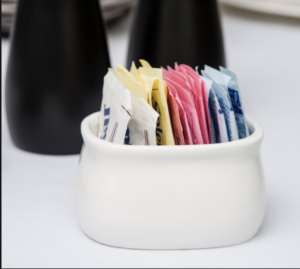
all of the sugar.
We were consuming it for good reasons, right?-
Sucralose, which is 600 times sweeter than sucrose, is one of the most commonly used artificial sweeteners in the market due to its extremely sugar-like taste, lack of a bitter aftertaste, stability at high temperatures, and long shelf-life (Grice and Goldsmith, 2000; Sylvetsky et al., 2012).
Without the bitterness and instability of previous fake sugars, we were able to cook and bake with Splenda, and this made us happy.
Our fake sugar obsession had evolved and we were making the smart choice. The healthy choice. The slimming choice.
‘Cept no.
We later learned that sucralose had effects just as terrible as fake sugars of the past.
It altered the gut microbiome in similarly insidious ways:
Enrichment of bacterial pro-inflammatory genes and disruption in fecal metabolites suggest that 6-month sucralose consumption at the human acceptable daily intake (ADI) may increase the risk of developing tissue inflammation by disrupting the gut microbiota, which is supported by elevated pro-inflammatory gene expression in the liver of sucralose-treated mice (source).
This basically means that Splenda inflames our guts, which inflames our bodies.
Here’s a sweet study that shows that exposure to sucralose can actually encourage the body to create a biofilm (like a bacterial forcefield) that protects and harbors pathogenic bacteria like E. Coli.
Yeah, that E. Coli that gives you constant unexplainable diarrhea.
So if you don’t want to get fat and poop your pants, stay away from Splenda.

photo courtesy of memegenerator.net
There are more fake sugars, but trust me when I say that you don’t want to go down that road anymore.
You have a few options you have if you just can’t extract your sweet tooth.
Reasonable Sugar Substitute #1: Stevia
Stevia is a herb. I’ve actually grown it before in my garden, and I will tell you one thing: natural stevia is nowhere near as sweet as super-processed, super-concentrated versions of stevia can be.
As with anything, exercise balance. I have gone through periods of time where I have quite literally become addicted to stevia. It is sweet, and it makes things tastier. I found myself craving sweets more often, and I also found myself using ever-increasing doses to get the right hit. This, I believe, is the definition of addiction. So I had to pull the plug and take some time off. It’s not good or normal to crave sweet things all of the time.
That said, in small amounts for targeted sweets, stevia is an acceptable choice.
While I have previously stated that stevia can encourage gut microbiome diversity and actually help gut health, I have to retract that statement as I was not able to corroborate that in the literature. I had heard this piece of information stated somewhere and liked it, so I repeated it. But the facts do not line up. Mea culpa.
I was able to find evidence, however, that stevia does not alter weight gain or glucose tolerance. This means small amounts of stevia are a reasonable way to get your sugar fix without making you gain weight or become more insulin resistant. In the fake sugar game, that’s a win.
Honestly, even though the research has not yet been done, I hypothesize that the lack of weight gain and also the lack of insulin resistance effects are actually due to favorable impact on the gut microbiome. But that research is not out there yet.

photo courtesy of giphycat.com
Reasonable Sugar Substitute #2: Monk Fruit
Monk fruit extract comes from the plant Siraitia grosvenorii and has not been studied as extensively as other sweeteners, but a few studies have shown that monkfruit does not damage the function of the body nor disrupt the body on a chromosomal level (source).
That same study did conclude that the long-term safety of monkfruit is…inconclusive. Do proceed with caution.
Reasonable Sugar Substitute #3: Sugar
Yup, you read that right. Just have a little bit of the real thing every once and awhile. If you are eating lots of protein (and you should be, dammit!), you will not have wild cravings for sugar. You will be nourished and therefore satiated.
It’s better to enjoy a moderate, occasional portion of the real thing instead of copious amounts of processed or fake substitutes. Just keep that in mind. I like molasses due to its high iron and B vitamin content. I like maple syrup just because it tastes amazing. I like honey because it has immune-boosting properties. And it’s in the Bible. A lot. Have small servings of whole-food sweeteners every once and awhile. Ok?
I hope this guide has helped you. I’m including a few of our favorite recipes to inspire and encourage you. Let me know what you think! Feel free to pass this guide along to anyone who can benefit from it. Thanks for reading!
Love,
Jennifer
I wanted to say thank you to my friend Dayna, who prompted this post:

